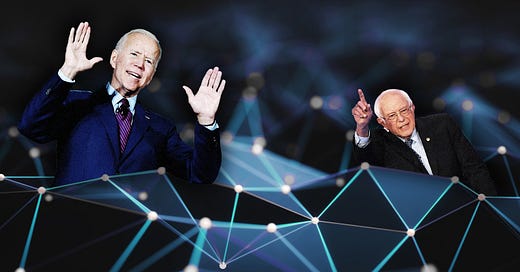
1. The Nature of Movements and Coalitions
I want to talk about last night and Biden and Bernie and why I've been convinced all along that Uncle Joe was likely to be the Democratic nominee. But to do that, we're going to have to step back and talk about some poli-sci-like material.
So bear with me.
The nature of practical politics changes with scale. If you're running for town council, you can win an election by making personal connections with most of the people who come out to vote for you. You don't need a movement or a coalition, you need a network.
If you're running for a congressional seat, a network isn't enough. You can't meet a significant number of the voting pool, but you can be buoyed by a larger movement. Sometimes these movements are external (it's a wave year for your party). Sometimes they're a specific program that you tie yourself to (the 1994 Republican Contract with America). And on rare occasions the movement is something the candidate themselves creates: AOC is a great example of this.
But if you scale up again, to the national level, movements aren't enough to win elections. To win an election you need a coalition.
And this is the important thing to understand: A movement is not a coalition.
Don't get me wrong—movements are powerful things. I often say that you underestimate them at your peril. And you can sometimes use a movement to build a coalition.
But the truth is that you can also build a coalition without a movement. And at the national scale, the coalition is vastly more powerful.
Coalition > Movement
I should put that on a pillow.
2. Bernie's Movement
The reason Bernie Sanders is going to drop out of the race—I'm guessing today or tomorrow—is because he created a movement, but never leveraged that movement into the building of a coalition.
And in truth, I'm not sure he ever even really tried.
To Bernie's credit, he did a lot of Latino outreach and seemed to try to add black voters, too. But he only made these efforts on his own terms. He invited Democratic voters to join his movement, but that's not really the same thing as meeting voters where they are and making yourself acceptable to them. Which is pretty much the short-hand definition of coalition-building.
The result is that Biden beat Sanders like a drum. Note that Bernie's support didn't really collapse. He just hit his ceiling and never outgrew it. The voters who were with him in 2016 as anti-Clinton protest votes never actually joined his movement and the minute there were alternatives, they left him. This was so pronounced that you even saw it in the vote totals from Vermont.
All of which brings us to why Donald Trump has been so scared of facing Biden in November.
Joe Biden sits at the head of a very broad coalition. It is similar to the coalition Barack Obama assembled—and keep in mind, Obama got more votes than anyone to ever run for president. The most substantial difference is that hat Biden has traded some progressive voters for some blue-collar whites. We do not yet know the net effect of this transaction, but I suspect it will be in his favor.
Trump does not have a coalition. He has a movement. His movement was enough to win in. a multi-polar primary field with a mere plurality of the vote and then to attain a perfect-storm victory against a very bad general election candidate. But once in office, Trump declined to turn his movement into a coalition: His every action has pushed marginal supporters away while cementing his relationship with the voters already in his movement.
In the short term, this served him well: Had Trump not bound his base more tightly to him, he might not have survived impeachment.
But in the long term, it has made him extremely vulnerable in his reelection campaign. His best hope had been to match up against a Democrat who, like him, had only a movement. That's why he was desperate to avoid Biden and draw either Elizabeth Warren or Bernie Sanders.
And now that he has to face Biden, I do not see how Trump builds a coalition at this late date.
Biden already commands the support of African-Americans, college-educated professionals, and suburban women. He is going to spend the next eight months eating into Trump's margins with blue-collar whites while college-educated whites continue to flee the Republican party of their own accord.
Trump's only play is to double-down on motivating his movement, which will have the effect of making it easier for Biden to harvest the marginal Trump supporters from 2016. And to the extent that Biden generates less enthusiasm than Obama did, Trump's antics will solve Biden's turnout problems for him.
The point of all of this is to underscore that at the scale of national politics, arena rallies, bumper stickers, and yard signs are not indicators of anything more than enthusiasm among a core of supporters. If that core is big enough and energized enough, it can turn into a movement.
But presidential elections are won by the candidate who builds the bigger coalition. Joe Biden has spent the last year assembling the foundations of a general election coalition.
And Donald Trump has yet to even try to build one.
3. Exit Take
This was probably my favorite blog post from last night, courtesy of 538's Geoffrey Skelley:
Looking at Missouri’s preliminary exit polling now that it’s been called, a sliver of good news for Sanders is that he only lost among black voters there 69 percent to 28 percent. Perhaps he’ll perform a little better among black voters farther north after struggling with them in the South. After all, a 41-point deficit is better than the 75-point deficit he faced in Mississippi, for example.











